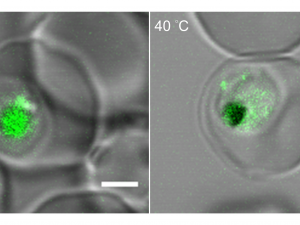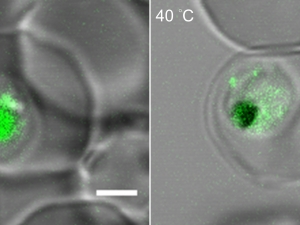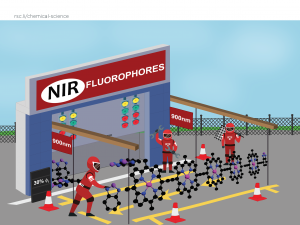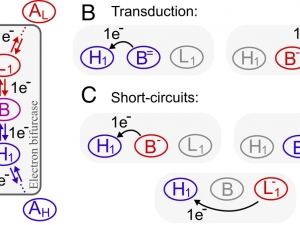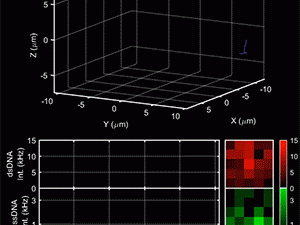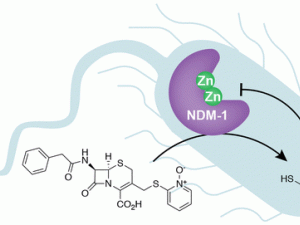Dean Valerie Ashby & Dr. Holden Thorp led a discussion this week on "Leading Science and Education during the Twin Crises of COVID-19 and Racial Injustice". If you didn't have an opportunity to join, please view it here. A special thanks to Duke Chem's NSF Center for Synthesizing Quantum Coherence for hosting this event. read more about Dean Valerie Ashby Talks Leadership & Education in Times of Crisis »
A recent collaborative effort between the Derbyshire lab at Duke and Prof. Jacquin Niles’ lab at the Massachusetts Institute of Technology discovered a mechanism that helps Plasmodium falciparum parasites survive hostile thermal conditions recapitulating malaria fever. The study shows that P. falciparum, the deadliest of the human malaria parasites, uses the lipid PI(3)P and heat shock protein 70 to stabilize the parasite’s digestive vacuole under heat stress. Read more about their discovery… read more about Derbyshire Lab Illuminates How Malaria Parasites Withstand Feverish Temperatures »
ACTIVE FACULTY ROBERT J. LEFKOWITZJames B. Duke Distinguished Professor of Medicine Robert Lefkowitz, M.D., has been a member of the Duke faculty since 1973 as a professor of medicine and a professor of biochemistry and chemistry. He won the 2012 Nobel Prize in Chemistry, sharing the award with Brian Kobilka, who did postdoctoral work with Lefkowitz at Duke. The two were recognized for their work on a class of cell surface receptors that have become the target of prescription drugs,… read more about A Look at Duke's Nobel Laureates »
DURHAM, N.C. -- Even when a person suffering from malaria is burning up with fever and too sick to function, the tiny blood-eating parasites lurking inside them continue to flourish, relentlessly growing and multiplying as they gobble up the host’s red blood cells. The single-celled Plasmodium parasites that cause 200 million cases of malaria each year can withstand feverish temperatures that make their human hosts miserable. And now, a Duke University-led team is beginning to understand how they do it. Assistant professor… read more about Duke Researchers Discover How Malaria Parasites Withstand a Fever’s Heat »
The National Science Foundation has awarded Duke University a $3 million, five-year Research Traineeship grant to develop a program for graduate students to develop expertise in using artificial intelligence (AI) for materials science research. The aiM (AI for Understanding and Designing Materials), program will fill a vital workforce gap by training the next generation in the new convergent field of materials and computer science research. “To achieve the promise of the U.S. Materials Genome Initiative of… read more about Filling an AI and Materials Science Training Gap »
DURHAM, N.C. -- A study published this week in the journal Nature Communications offers some good news in the search for antiviral drugs for hard-to-treat diseases. Researchers have identified a potential new drug candidate against enterovirus 71, a common cause of hand, foot and mouth disease in infants and young children. The compound of interest is a small molecule that binds to RNA, the virus’s genetic material, and changes its 3-D shape in a way that stops the virus from multiplying without harming its human host.… read more about New Drug Candidate Found for Hand, Foot and Mouth Disease »
May 6, 2021 Update: Jonathon Yuly and his co-authors, including Peng Zhang and David Beratan, were awarded Proceedings of the National Academy of Sciences's 2020 Cozzarelli Prize for their paper on electron bifurcation. The award is given annually to six research teams whose articles have made "outstanding contributions to their fields." You can hear Yuly describe the paper in the video above or in an episode of PNAS's Science Sessions… read more about PhD Student Solves 40-Year Bioenergetics Mystery »
Professor Weitao Yang delivered the Introductory Lecture at the Royal Society of Chemistry's Faraday Discussion “New Horizons in Density Functional Theory”. Professor Yang's lecture, “When the Density of the Noninteracting Reference System is not the Density of the Physical System in Density Functional Theory”, began the discussion earlier this week. As the Introductory Lecturer, Professor Yang set the scene for the discussion by providing a perspective on the state of the field.… read more about Weitao Yang Delivers Introductory Lecture at Faraday Discussion »
The Therien lab studied highly conjugated porphyrin arrays and incorporated proquinoidal linkers— small molecules that have closely aligned LUMO energy levels to the parent porphyrins arrays. They found that capping porphyrin arrays with proquinoidal moleculesarray preserves and enhances conjugation, resulting in a red-shifted emission, while also increasing the radiative rate constant, making these systems uniquely good NIR fluorophores. Read about this excellent work by Erin, Dr. Peng Zhang and former… read more about Highly Conjugated NIR-absorbing Fluorophores Display Extraordinary Absolute Fluorescence Quantum Yield Values »
The signs of change were all around: Students walking around campus wearing face masks, talking to new friends in distanced circles. Socializing tents scattered around campus. Seminars in large rooms with seats spaced out. But the first day of classes also had much that was familiar. Students strolled along pathways with coffee and food-for-later in hand. Groundskeepers zipped past on riding mowers while joggers circled the East Campus loop, albeit giving each other plenty of room. Most importantly, there was… read more about The First Day of Classes Start With Masks, Distancing and Vigorous Classrooms »
A paper just published by the Beratan Lab resolves a long standing puzzle in molecular bioenergetics. A class of reactions that lies at the core of biological energy conversion - and underpins Mitchell’s Nobel Prize winning chemiosmotic hypothesis - had remained enigmatic for nearly 50 years. Cursory analysis of these reactions suggested that they should “short circuit” and dissipate energy, rather than transduce it. Jon Yuly, a Physics graduate student at Duke, working with Profs. Beratan and Zhang in… read more about One Universal Free-energy Landscape Supports Efficient Electron Bifurcation Reactions »
The Warren Lab has demonstrated a simple optical measurement method to evaluate the efficacy of masks to reduce the transmission of respiratory droplets during regular speech. In proof-of-principle studies, they compared a variety of commonly available mask types and observed that some mask types approach the performance of standard surgical masks, while some mask alternatives, such as neck fleece or bandanas, offer very little protection. Read about Dr. Fischer's findings in a recent issue of Science Advances… read more about A Box, a Laser, a Lens, and a Cell Phone: Visual Proof that Face Masks Work in the COVID Fight »
Very commonly, molecules don't evolve simply under quantum mechanics-the evolution is interrupted by exchange or reactions. The study of this kind of coherent evolution in dynamic systems is at the forefront of many disciplines, but has been prominent in magnetic resonance for more than 50 years. However, the arguments that led to the theoretical formalism were motivated under incorrect assumptions. The Warren lab has recently reported on a complete re-interrogation of this problem, and has presented a corrected theory that… read more about Warren Lab Completely Reassess the Foundations of Chemical Exchange Models »
Professor Matthew Becker has been named as a Fellow of the American Chemical Society! This designation is awarded to members who, in some capacity, have made exceptional contributions to the science or profession and have provided excellent volunteer service to the ACS community. Chemistry alumnus Rudy Baum (C&EN, Retired) joins Matt as a 2020 Fellow. Congratulations! read more about Becker Named ACS Fellow »
We recognize the high level of stress and uncertainty brought on by the constantly shifting circumstances of the Covid pandemic. Please know your faculty and staff in Chemistry have been working diligently to develop an academic plan that considers the disruptive changes and tries to accommodate students in so many different situations. If you are a Chem Major, please review these FAQ's before you register for Fall classes: https://chem.duke.edu/undergraduate/faqs-fall-2020-course-offerings. read more about INFO FOR CHEM FALL REGISTRATION »
Measuring the behavior of single molecules enables the discovery of states and dynamics obscured by bulk measurements. However, molecules in solution rapidly diffuse in three dimensions, precluding long-duration and high-temporal resolution measurement. In a new breakthrough, Dr. Shangguo Hou of the Welsher Lab has developed 3D single-molecule active real-time tracking (3D-SMART), which can “lock-on” to freely diffusing single molecules in solution for up to minutes at a time! This new single molecule tracking can be… read more about Untethering Single Molecule Spectroscopy with 3D-SMART »
The Derbyshire lab is examining biosynthetic gene clusters of bacteria isolated from the gut of Anopheles mosquitoes, the main vector for the transmission of malaria. Through a bioinformatic analysis, iron-binding siderophores were abundant within microbiome bacteria. After testing the metabolites, two siderophores disrupt mosquito reproduction and also inhibit blood and liver forms of the malaria parasite. Overall, this study sets a foundation for new vector control strategies to inhibit the transmission… read more about Derbyshire Lab Sets Foundation for Inhibiting Transmission of Malaria Parasite »
The thin, slippery layer of cartilage between the bones in the knee is magical stuff: strong enough to withstand a person’s weight, but soft and supple enough to cushion the joint against impact, over decades of repeat use. That combination of soft-yet-strong has been hard to reproduce in the lab. But now, Duke University researchers say they’ve created an experimental gel that’s the first to match the strength and durability of the real thing. The material may look like a distant cousin of Jell-O -- which it is -- but it’s… read more about From the Lab, the First Cartilage-Mimicking Gel That’s Strong Enough for Knees »
The herculean efforts to re-start Duke’s campus and medical school research laboratories are nearly complete. Thousands of lab workers, kept from their benches and equipment for months by the COVID pandemic, are shaking off the cobwebs and getting back to work generating data. But with some significant differences. “I think it'll take me a few weeks to actually get back into the rhythm,” said Tatiana Segura, a professor of biomedical engineering who has a large team in two laboratory spaces in Fitzpatrick-… read more about Duke’s Labs Are Back in Business, But In a New Way »
We invite each member of the department, especially faculty, to join us to take this time to reflect on our own actions and the ways for us as individuals, labs and a department to do better at "eradicating racism in our midst” as challenged by the Chair. We encourage authentic conversations around these topics within our community and will also be having them as faculty. Resources: https://www.shutdownstem.com/ and https://www.particlesforjustice.org/ read more about Duke Chemistry Participates in #ShutDownSTEM »
Viral RNA structures are known to regulate replication but are under-explored as drug targets. In work funded by the Research Corporation for Science Advancement (RCSA), a team led by Professor Amanda Hargrove and Professor Kathryn Mouzakis (LMU) will work to identify the first antivirals that target a SARS-CoV-2 RNA structure critical to effective translation of viral proteins, ultimately inhibiting viral replication. During an early step in the SARS-CoV-2 lifecycle, the genomic RNA is translated to produce… read more about Hargrove Lab Funded to Target SARS-CoV-2 RNA Structures »
Emily Derbyshire wants to help people—and she wants to do it at scale. Derbyshire became a professor because she felt the university setting offered opportunities she wouldn’t get elsewhere: pursuing research on diseases that drug companies wouldn’t fund and mentoring a diverse group of future chemists to expand access to the field. In April, the assistant professor of Chemistry was named a 2020 Camille Dreyfus Teacher-Scholar in recognition for her work on both fronts. “I definitely felt honored and humbled,” Derbyshire… read more about Fighting Malaria in the Classroom and the Lab »
When a professional journal in your field dedicates an entire issue to reviewing your life’s work, you have a unique opportunity to look back on your career. “I can’t believe I’m as old as I am,” said David Beratan, who recently had that experience when the Journal of Physical Chemistry B published a special issue in honor of his 60th birthday. “It’s a privilege, an honor. It’s flattering and a little bit embarrassing.” Of course, not everyone gets this treatment, however long their careers. Beratan, the R.J.… read more about David Beratan Reflects on the Humans Behind the Science »
DURHAM, N.C. -- Electrolysis, passing a current through water to break it into gaseous hydrogen and oxygen, could be a handy way to store excess energy from wind or solar power. The hydrogen can be stored and used as fuel later, when the sun is down or the winds are calm. Unfortunately, without some kind of affordable energy storage like this, billions of watts of renewable energy are wasted each year. For hydrogen to be the solution to the storage problem, water-splitting electrolysis would have to be much more affordable… read more about Flow-Through Electrodes Make Hydrogen 50 Times Faster »
In 2020-2021, the Duke University Energy Initiative’s Energy Research Seed Fund will support projects addressing renewable energy’s integration into the grid, battery performance, electrochemical catalysts, utilities’ decision-making, the energy-water nexus, and energy’s connections with war and health. The Energy Research Seed Fund has a strong track record of investing in early-stage projects that go on to secure external support. The program will award six grants to projects involving thirteen… read more about Energy Research Seed Fund awards six grants to Duke faculty to kickstart innovative projects »
We are thrilled to announce that Prof. Charlie Cox will join the Department to further expand Chemical Education in Chemistry! Professor Cox will promote active learning, including the use of flipped classrooms and case studies to improve learning and retention as an Associate Professor of the Practice. Charlie was born in North Carolina and completed his undergraduate program at NC State where he explored research in biophysical chemistry. He completed his doctoral study at Clemson with… read more about Charlie Cox to Join on August 1! »
New antibacterial strategies are needed to overcome drug resistance in pathogenic bacteria that produce resistance enzymes called metallo-β-lactamases. The Franz lab and graduate student Abbey Jackson recently discovered that their antibacterial prodrug PcephPT is able to inhibit these enzymes. PcephPT, an antibacterial prochelator that releases the metal-binding agent pyrithione (PT) upon cleavage by β-lactamases, inhibits the clinically important metallo-β-lactamase NDM-1 by interacting with the zinc-… read more about Franz Lab Takes Aim at Drug Resistance with Metal Binding Agents »
Fifteen Duke Ph.D. students have received prestigious awards from the National Science Foundation’s Graduate Research Fellowship Program (NSF GRFP) for 2020. Launched in 1952, the GRFP is the oldest graduate fellowship of its kind. It supports outstanding graduate students in NSF-supported science, technology, engineering, and mathematics disciplines who are pursuing Ph.D. or research-based master’s degrees. Fellows receive a three-year stipend, coverage of tuition and fees, and opportunities for international research and… read more about 15 Ph.D. Students Receive Prestigious NSF Fellowships »
The Department congratulates the graduating Class of 2020! We invite you visit the Marking the Moment webpage to view a video of Chemistry faculty and YouTube to see a video of our graduates! We wish you all well as you begin your next journey! Amazing adventures await! read more about Congratulations to the Class of 2020 Graduates! »
Congratulations to the following student award winners from Duke University units in 2020. African & African American Studies John Hope Franklin Award for Academic Excellence: Elizabeth DuBard Grantland Karla FC Holloway Award for University Service: Beza Gebremariam Mary McLeod Bethune Writing Award: Jenna Clayborn Walter C. Burford Award for Community Service: Kayla Lynn Corredera-Wells Art, Art History & Visual Studies… read more about Student Honors and Laurels for 2020 »


